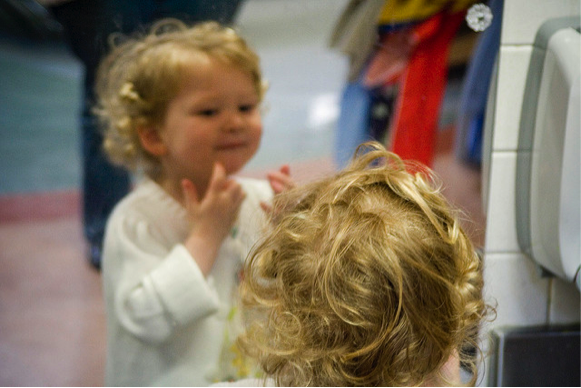
The other day my little eight year-old childcare client looked at me with a frown on her face and said, “I’m fat and my friends and the people on TV are skinny.” I was so upset. I don’t think cute little kids like Lily should worry about the way they look. When I was Lily’s age my only goal was to eat chips and play soccer. As a child of the 90’s, I wasn’t concerned about body image like kids are today. I suspect easily accessible screen media is a primary contributor to body shame, with its almost constant barrage of carefully staged ads and social media selfies.
Sexualized images are often staged so the model’s body looks like an object or a commodity. Psychologists call this objectification. Multiple exposures to objectified bodies can hardwire a child to emulate this ideal. Imagery like the “uncovering of Kim Kardashian” or Dwayne Johnson’s six-pack seems to be everywhere. And by “imagery” I’m referring to perfectly made up, tucked, lit, and digitally enhanced images. Sometimes images in ads are even made up of body parts from several different models! How can non-virtual people possibly compete with that?
 Kids and access to media
Kids and access to media
From my work as a camp counselor, I’ve observed that young kids have ample access to screen media. Between the United States and Western Europe it is estimated that 65.3 million children have access to the Internet at home (Bennett, 2006). It is not unusual to see my young clients tracking their favorite celebrity idols online and through social media.
For example, Lily loves the pop idol, Taylor Swift. She delights in frequent discussions about how Taylor is so beautiful and skinny. And I can’t blame her. The truth is, most of us glamorize beauty over talent. I am not saying that Taylor is not talented, but would she be in the eye of the media if she looked more like the heavier award-winning singer, Adele? I believe that Adele is just as talented and beautiful as Taylor, but Taylor has an image most Americans idealize, a skinny blond.
Recently I tried a little experiment with Lily. I played a song by Adele and a song by Taylor. Without telling her whom the vocalists were, I told her to pick her favorite song. Not surprisingly, she chose Adele’s song. Then I showed her photographs of the singers. Immediately Lily changed her mind, elaborating, “Taylor is so perfect and I love her so much.” Not surprisingly, Lily’s opinion was clearly swayed by Taylor’s looks.
How often are our opinions based on image rather than substance?
Most of us dread the day we wake up and realize we are turning into our parents. Parents are typically more influential role models than pop stars. Kids have frequent access and look for comfort from their parents. As a result kids are particularly responsive to their parents’ influence, because they need them to survive. Kids are biologically programmed to imitate parents.
Sadly for kids, parents are not perfect people. It is not uncommon for parents to complain about their bodies in front of their kids. Remember that advertisement with the hot model that said, “If you want to look like this, you need <this product>!” Do you remember how it made you feel? Did you compare yourself to the model? Perhaps feel a touch of shame? Perhaps those feelings led you to say, “Do I look fat in this?” Or maybe you made a disparaging commented about your least favorite body part. Just as parents feel shame from media objectification, they also pass these feelings and perceptions on to their children.
During camp, I also met eight year-old Angela. Angela’s mom recently had breast enhancement surgery. One day Angela showed me a picture of her mom before the surgery. She said, “My mom doesn’t look like this anymore, because she went to the hospital.” Then I asked her what she thought about her mom’s new look. She replied, “One day I want to go to a hospital and be as pretty as her.” Again, I was upset for little Angela. I understand the impulse of wanting to improve your looks with cosmetic surgery, but what impact did this have on Angela’s perception of her body? Based on her comments, she was already forming a perception of before and after beauty, with her natural childhoos beauty as the lesser-than “before” version. 
It’s not just girls that are negatively affected by sexualized objectification, boys can feel body same too. Recently I have been gaining muscle due to my fitness regimine. Recently I was hanging out at home when I noticed that my little brother was secretly working out in his room. When I asked what he was doing, he replied “I’m building muscles like you!” He even asked if he could come to the gym with me. Although I’ll admit I was a little bit flattered, I was also worried. Like Lily, I think it is healthier for him to focus on the process of exercise and how it makes him feel rather than worry about building muscle.
When do children start to feel body shame?
From what I have observed with younger kids, I believe that kids start feeling shame as soon as they have self-awareness. According to the research of Brownell, Zerwas, & Ramani (2007), body self-awareness emerges as a child nears three years old. As media images bombard us at higher and higher rates, starting younger and younger, we become more susceptible to emotional harm from social comparison.
Tips To Help Our Kids Get Safe From Media Shame
- Filter screen content and limit the frequency of screen use with Dr. Bennett’s GetKidsInternetSafe techniques.
- Introduce your children to healthy role models who make an impact with thought and action rather than a sexy selfie. Talk to them about important historical figures like Nelson Mandela, Albert Einstein, or Thomas Edison. Just doing the research for positive mentors can be cool bonding learning experience.
- If you are making cosmetic changes to your appearance, take the time to discuss it with your kids using the appropriate discretion for their stage of development.
- Avoid demeaning jokes and comments toward your kids, such as calling them “chubby” or pinching cheeks.
- Stop making critical remarks about yourself in front of them. Teach them to love themselves by modeling self-confidence and self-nurturance.
- Most importantly, show them that you love them for being their unique themselves. A child’s worth is reflected in who they are, not what they look like.
Remember, “SHAME IS LAME.”
Because you are an extraordinary parent, you won’t want to miss, “What Parents Need to Cover About Kim Kardashian’s Un-covering.” And please do me a favor, scroll down and leave a comment about what you think about your body, the media, and how you communicate self-worth and nurturance to your children.
 Congratulations and thank you to Cristian Garcia, CSUCI intern, for authoring this awesome GKIS article!
Congratulations and thank you to Cristian Garcia, CSUCI intern, for authoring this awesome GKIS article!
I’m the mom psychologist who will help you GetKidsInternetSafe.
Onward to More Awesome Parenting,
Tracy S. Bennett, Ph.D.
Mom, Clinical Psychologist, CSUCI Adjunct Faculty
GetKidsInternetSafe.com
Photo Credits:
Hey There Sweetnes by Courtney Carmody, CC BY-SA 2.0
The replacement for Saturday morning cartoons by Wesley Fryer, CC BY 2.0
Taylor Swift by Prayitno, CC BY 2.0
Lucie & ses parents-4 by Thomas sauzedde, CC BY 2.0
Bad to the bone by Robbie Grubbs, CC BY-NC-ND 2.0
Plastic-surgery-0902-01 by Madelineyoki, CC BY-SA 2.0
Funny faces for auntie mcb by McBeth, CC BY-NC-ND 2.0
References
Bennett, C. (2006). Keeping up with the kids. Young Consumers, 7(3), 28.
Brownell, C. , Zerwas, S. , & Ramani, G. (2007). So big: The development of body self-awareness in toddlers. Child Development, 78(5), 1426-1440.
Don't worry, we will never spam you.












